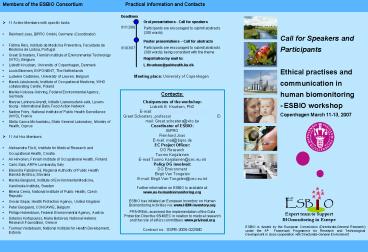PowerPointPrsentation - PowerPoint PPT Presentation
1 / 2
Title:
PowerPointPrsentation
Description:
E-mail: Birgit.Van-Tongelen_at_cec.eu.int. Further information on ESBIO is ... Maryse Lehners-Arendt, Initiativ Liewensufank asbl, Luxem- bourg - International ... – PowerPoint PPT presentation
Number of Views:25
Avg rating:3.0/5.0
Title: PowerPointPrsentation
1
Practical information and Contacts
Members of the ESBIO Consortium
- 11 Active Members with specific tasks
- Reinhard Joas, BiPRO GmbH, Germany (Coordinator)
- Fátima Reis, Instituto de Medicina Preventiva,
Faculdade de Medicina de Lisboa, Portugal - Greet Schoeters, Flemish Institute of
Environmental Technology (VITO), Belgium - Lisbeth Knudsen, University of Copenhagen,
Denmark - Louis Bloemen, EXPONENT, The Netherlands
- Ludwine Casteleyn, University of Leuven, Belgium
- Marek Jakubowski, Institute of Occupational
Medicine, WHO collaborating Centre, Poland - Marike Kolossa-Gehring, Federal Environmental
Agency, Germany - Maryse Lehners-Arendt, Initiativ Liewensufank
asbl, Luxem- bourg - International Baby Food
Action Network - Nadine Fréry, National Institute of Public Health
Surveillance (InVS), France - Stella Canna Michaelidou, State General
Laboratory, Ministry of Health, Cyprus - 11 Ad Hoc Members
- Aleksandra Fucic, Institute for Medical Research
and
Deadlines
Oral presentations - Call for speakers Participant
s are encouraged to submit abstracts (300 words)
01/12/06
Call for Speakers and Participants Ethical
practises and communication in human
biomonitoring - ESBIO workshop Copenhagen March
11-13, 2007
Poster presentations Call for
abstracts Participants are encouraged to submit
abstracts (300 words) being consistent with the
theme Registration by mail to L.Knudsen_at_pubhealth
.ku.dk
01/03/07
Meeting place University of Copenhagen
Contacts Chairpersons of the workshop Lisbeth
E. Knudsen, PhD E-mail L.Knudsen_at_pubhealth.ku.dk
Greet Schoeters, professor
E-mail Greet.schoeters_at_vito.be
Coordinator of ESBIO BiPRO Reinhard
Joas E-mail mail_at_bipro.de EC Project Officer DG
Research Tuomo Karjalainen E-mailTuomo.Karjalaine
n_at_cec.eu.int Policy DG involved DG
Environment Birgit Van Tongelen E-mail
Birgit.Van-Tongelen_at_cec.eu.int Further
information on ESBIO is available
at www.eu-humanbiomonitoring.org ESBIO has
initiated an European Inventory on Human
Biomonitoring Activities via www.HBM-inventory.or
g PRIVIREAL examined the implementation of the
Data Protection Directive 95/46/EC in relation to
medical research and the role of ethics
committees www.privireal.org Contract no.
SSPE-2005-022580
ESBIO is funded by the European Commission
(Directorate-General Research) under the 6th
Framework Programme for Research and
Technological Development in close cooperation
with Directorate-General Environment
2
Ethical Practises in Human Biomonitoring
Workshop on Ethical Practices in Europe
Human Biomonitoring and ESBIO
- Human biomonitoring is a scientific technique for
assessing human exposure to and health effects
from environmental pollutants. It is based on
sampling and analysis of human tissues and fluids
(e.g. blood, urine) and it is seen as a powerful
tool to support environment policy as well as
public health policy. - The figure illustrates the exposure-disease
sequence in which biomarkers can measured as
indicators of environmental exposures, early
predictors of adverse human health effects and
susceptibility. - The European Environment and Health Strategy
adopted by the European Commission in 2003
presented a new vision on how to address
environment and health in an integrated way and
puts health in the centre of environmental
policy. Based upon the Strategy the Commission
adopted in 2004 a Communication on the
Environment and Health Action Plan 2004 2010.
In Action 3 of this Action Plan the European
Commission announces to develop a coherent
approach to Human Biomonitoring in Europe in
close cooperation with the Member States. - The ESBIO project (Expert team to Support
BIOmonitoring in Europe) was launched by the
European Commission in October 2005 and consists
of 22 European experts on human biomonitoring,
coming from national governments, research
institutes, industry and NGOs in 17 Member
States and Croatia.
- An overview on how ethical issues are already
practiced in different countries and projects,
current legislation and optimal harmonized
procedures related to individualized
biomonitoring identified and analyzed as an
important part of the ESBIO project will be
presented at the workshop. - The workshop will provide two days of debate on
identifying major items for guidelines for
ethical issues in human biomonitoring. The
workshop will focus on the following themes - Justification of interventions
- Autonomy
- Beneficence
- Non-maleficence
- Transparency
- Recruitments
- Motives of participation
- Altruism, benefit, knowledge, citizenship,
voluntary - Information practices
- Situated informed consent
- Critical circumstances
- Decision-making capabilities
- Assent
- Right to know and not to know
- Target group specific communication
Human biomonitoring studies are increasing in
Europe, however no uniform guidelines on ethical
issues such as how to inform the participants and
how to protected personal data exist.
Research with and on human individuals is
necessary and appropriated communication is
needed.
European practices in informing, consenting and
managing ethical issues related to human
biomonitoring studies gathered from the inventory
by SCALE, the PRIVIREAL website and from
interviews with stakeholders (e.g., study
persons, nurses, technicians, researchers,
regulators, etc.) will be identified and analyzed
in ESBIO. Specific attention will be devoted to
the use of biobanks and information obtained in
common databases and adhering regulations in
force and foreseen. In order to identifying
major items for guidelines for ethical issues in
European human biomonitoring, this workshop aims
to invite a broad range of stakeholders.
The figure illustrates the various groups of
stakeholders involved in the different steps of
human biomonitoring. Two days of presentations
by the various stakeholders allowing diverse
views and understanding of the advantages and
limits of human biomonitoring to be debated may
improve to the current understanding of factors
causing ethical conflicts by promoting exchange
of experiences.































